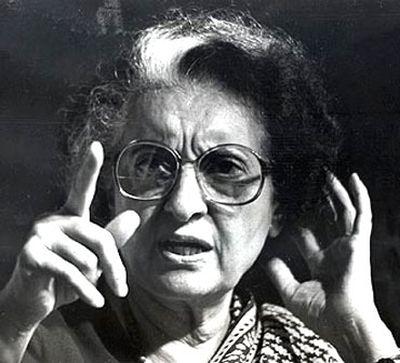A nightmare called Emergency, 44 years on
June 25, 2019 11:46

'Emergency' is a word that's casually thrown about by political opponents to run down the government of the day, but very few would have any idea of the kind of horror that India had been through for 21 painful months, when Prime Minister Indira Gandhi decided to impose Emergency to counter what she saw as challenges to her leadership, on this day 44 years ago.
'The Constitution of India was suspended' is a term that is glibly used to sum up what a state of Emergency meant, but no words can describe the horror imposed when all civil liberties, that flow from the Constitution, were suspended.
In short, Right to Life was suspended. Thousands of political opponents, civil activists, students, lawyers were detained across the country. People simply disappeared, to never be heard of again. The famous Rajan case from Kerala was one of them, and was even made into a poignant film. It could have happened to anyone, writes Rajeev Srinivasan.
A draconian piece of legislation called Maintenance of Internal Security Act was drafted to stifle dissent and protests. Press censorship was imposed, so citizens would not know what was going on.
All this, one would have imagined, would have made a young nation that had freed itself from the yoke of foreign rule not too long ago rear up and agitate but no, the converse was true. Barring pockets of resistance, India, it seemed, had decided to buckle under. In LK Advani's famous words, we crawled when asked to bend.
As former journalist K R Sunder Rajan, who was imprisoned then, wrote on Rediff.com, 'The real point is that a people who put up such a brave fight against foreign rule surrendered to Indira Gandhi's Emergency like a flock of sheep.'
Finally, when Mrs Gandhi decided to lift Emergency in March 1977 and order fresh elections, it was not because India had become more ungovernable. She did it because internal surveys pointed to the citizens' happiness over trains running on time and government offices working like clockwork (cliches that are even today used to whitewash the excesses of the time like mass sterilisation), and that the people will vote her back.
But the opposite happened. The very same political forces she hoped to nip in the bud in June 1975 now rode to power on the back of a popular mandate. Popular rage, we realised then, need not always boil over to the surface; it can also simmer at a subterranean level, and explode at the right time.
As for Mrs Gandhi, she was elected back to power in 1980, but she never recovered fully from the Emergency setback.
Alas, neither did the nation.





 © 2024 Rediff.com -
© 2024 Rediff.com -